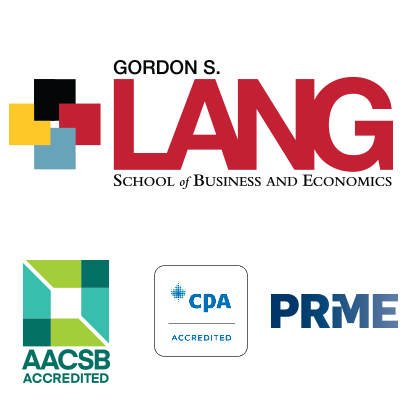
New Lang finance professor Dr. Fred Liu's [1] research explores how AI can impact financial economics and markets. In this Q&A article, Dr. Liu answers how he plans to use his expertise as a professor and researcher at Lang.
Dr. Fred Liu is originally from Markham, Ontario and earned his PhD in Economics from Western University. He received undergraduate degrees from Wilfrid Laurier University and the University of Waterloo in Finance and Economics, respectively.
Tell us about the focus of your research.
"My primary fields of interest reside within the intersection of financial econometrics (finance and statistics), machine learning, asset pricing, and risk management. I have a (joint) publication on Basel 3 market risk and its regulatory capital implications, which I presented at the European Central Bank. I also have a (joint) forthcoming publication using machine learning to predict high-frequency stock market returns, which was invited by the chief editors of the Journal of Financial Econometrics. Finally, I have written an asset pricing paper that creates a new measure of firm-specific tail risk and demonstrates why it matters to investors and regulators.
Currently, I am working on several projects adapting machine learning to large and high-dimensional financial datasets. One project studies the high-frequency predictability of individual stocks. Another project aims to improve market risk measurement using machine learning techniques. Overall, my goal is to use financial econometrics and machine learning to improve financial risk management."
Who can benefit most from your research?
"My research can benefit investors, risk managers, and regulators. Investors are often interested in anticipating short-term financial market movements, which can be forecasted using the machine learning models in my forthcoming paper. Risk managers need to understand the behavior of extreme losses of their financial assets and its implications for capital requirements, which is studied in my market risk paper. The paper demonstrates how the new Basel 3 regulations affect banks’ choice of risk models, which is important to regulators such as the European Central Bank."
What research publication are you most proud of? and what did the article explore?
"I am most proud of my forthcoming paper that uses machine learning models to forecast high-frequency stock market returns. The paper is motivated by the idea that markets may be predictable in very short time horizons, since it takes time for traders to incorporate information into prices. To test this idea, we conduct the largest study ever of five-minute equity market returns using state-of-the-art machine learning models trained on the cross-section of lagged market index constituent returns. The paper has three main findings. First, high-frequency market returns are predictable, though this predictability has decreased over recent years. Second, this predictability is profitable after transaction costs. Third, consistent with slow traders, predictability is higher during the middle of the day, and during volatile or illiquid days. These results provide strong evidence that stock market returns are predictable during short time horizons."
How do you plan on contributing to Lang's mission of using business as a force for good?
"Finance research is extremely important to discover new knowledge and develop a deep understanding of capital markets and the financial system. It is my social responsibility to leverage my knowledge, together with my talented colleagues, to help society identify and measure the risk hidden in the financial system and contribute to its safety and stability.
Additionally, I will use the classroom to provide finance knowledge, skills, and technologies that will enable our students to lead organizations in using business as a force for good. I am extremely excited to work with the outstanding faculty at Lang and contribute to its mission."
